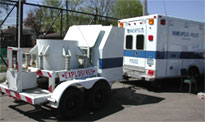 Sometimes, employers or insurers will tell you that your case is closed to get you to abandon your claim for wage-loss benefits or to submit your medical costs through your major medical health insurance. They do this to save money on your claim, but don’t fall for this deception!
Sometimes, employers or insurers will tell you that your case is closed to get you to abandon your claim for wage-loss benefits or to submit your medical costs through your major medical health insurance. They do this to save money on your claim, but don’t fall for this deception!
As long as you have benefits available, and you have not signed a settlement agreement giving up your right to future benefits, your claim can be re-opened even if your insurance adjuster tells you that it has been closed.
If your claim has been accepted by your employer and its workers’ compensation insurer or you begin to receive benefits pursuant to an Order from the court, your workers’ compensation claim will stay open as long as you have benefits available.
The availability of benefits depends on many factors. There are four types of benefits under the Minnesota Workers’ Compensation Act including medical benefits, wage loss benefits, rehabilitation services, and permanency.
Each type of Workers’ Compensation benefits has a different time limit, which may vary depending on the date of your work injury:
1. Medical benefits
Medical benefits are available as long as the medical care you receive is reasonable and necessary to cure or alleviate the effects of your work injury. It doesn’t matter if one year has passed or ten years have passed. It also doesn’t matter if you change employers or move out of the state of Minnesota. As long as the medical care is reasonable and necessary to cure or alleviate the effects of your work injury, you’re covered!
2. Wage-Loss Benefits
There are different time limits on the different types of wage-loss benefits available under the Minnesota Workers’ Compensation Act.
- Temporary Total Disability (TTD)
For injuries that occurred on 10/1/2008 or later, injured workers can receive up to 130 weeks of TTD. These weeks can be taken consecutively or intermittently. TTD benefits will continue as long as you are completely unable to work due to your work injury or until you reach 90 days post-Maximum Medical Improvement (MMI). MMI is not the point at which you recover but, rather, it’s when your recovery plateaus.
- Temporary Partial Disability (TPD)
Injured workers can receive up to 225 or 275 weeks of TPD (depending on the date of injury). Again, these weeks do not need to be taken consecutively and can be taken intermittently. However, an injured worker can only receive TPD for up to 450 weeks following the date of injury.
- Permanent Total Disability (PTD)
Injured workers can receive PTD through retirement age or until age 72 (depending on the date of injury). Generally, PTD is a wage-loss benefit for injured workers who will never be able to return to work due to their work injury.
3. Rehabilitation Services
Depending on the how long the employee is expected to be off work, the employee may be eligible for rehabilitation services through a Qualified Rehabilitation Consultant (QRC). These rehabilitation services may be ended when the employee’s rehabilitation plan is complete or 30+ days after the employee returns to work.
4. Permanency
Permanency is a rating dictated by statute that results in one-time compensation for the loss of use or function related to the work injury. Although permanency is a one-time payment, an injured worker may be entitled to additional permanency over the course of their lifetime if their work-related disability worsens. There is no time limit on when you can receive permanency.
Impact of Settlement
If you settle your claim, then you may have given up your right to bring a claim for certain workers’ compensation benefits in the future. Every settlement agreement is different. If you have questions about whether certain workers’ compensation benefits are still available to you, then you should contact a workers’ compensation attorney to review your settlement agreement with you and determine what claims, if any, are left open by its terms.
Sometimes, a settlement agreement will close out “indemnity” benefits (including wage-loss benefits, rehabilitation services, and permanency), but will leave certain medical benefits open, meaning that you can still bring claims for these benefits. Don’t take the insurance company’s word for it! A workers’ compensation attorney will help you determine which benefits are still available to you.
Conclusion
The time limits for the various work comp benefits available to you vary based on the type of benefit claimed. If a workers’ compensation insurance adjuster tells you that your claim is closed, don’t assume they are telling you the whole story.
The workers’ compensation system is complicated, which is why it is important to consult with an attorney who knows this area of law to ensure that your rights are protected. The attorneys at Meuser, Yackley & Rowland, P.A. can help you navigate these complexities to ensure that you are getting maximum benefit for your claim.

